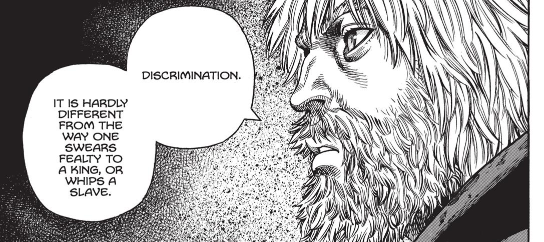Context: I just finished writing my TOK essay so I can sometimes say some things that are rather too philisophical in a way… But HEY! It’s really good!

I started watching Vinland Saga during my trip to Japan. It was a quiet night, the neon lights from the streets below flickering against my hotel window, and I needed something to ground me after a day of navigating unfamiliar streets. What I didn’t expect was to find a story that would consume me, a story that would make me reconsider the very fabric of love and power.
There is a moment that lingers in my mind, a conversation that should have been fleeting but instead became a philosophical noose tightening around the narrative’s throat: Love is a form of discrimination. The priest’s words to Canute were not mere ramblings of a drunken philosopher; they were a thesis on the human condition, a deconstruction of love that few stories dare to explore. Love, in its traditional understanding, is a preferential force. To love one thing is to elevate it above others, to grant it special status, to inherently exclude. Equality and love, therefore, exist in tension. If one truly loves all equally, does that not diminish the power of love itself?
The priest speaks of God’s love—universal, impartial, like the snow that falls on all things without bias. But man cannot achieve this, for human love is defined by choice. We love selectively, instinctively. We grant warmth to those in our circle while the rest remain in the cold. And yet, this is not necessarily wrong—it is simply the human condition. Canute, however, refuses to accept this limitation. His love mutates into something systematic, an ideology rather than an emotion. If love is to be truly just, he believes, then it must be imposed upon all. His transition from meek, almost ethereal prince to a cold, calculated ruler is not merely a character arc—it is the embodiment of a political ideology birthed from misplaced love. The moment Canute declares that the world must be reshaped under his rule, we are witnessing the perversion of love into dominion, the divine right of kings justified through affection instead of lineage.
But if Canute’s interpretation is tyranny masked as love, then Thorfinn’s journey is an inverse struggle—a painful rejection of violence, but also a slow understanding of its necessity. In a world where discrimination is inevitable, how do we navigate love without falling into cruelty? Thors, his father, embodied this paradox. He refused to wield a sword, to take life, because he valued all life equally. But by doing so, he condemned himself, for the world he lived in demanded the discrimination that comes with love—he loved his son, his people, and in turn, he had to turn his back on others. Is this not, too, an exclusion? And so, we return to the central contradiction: love necessitates preference, which in turn creates discrimination.
This creates another paradox lurking beneath this discourse—the symbiosis of love and hate. If love is an act of discrimination, then what happens when one rejects all forms of preference? In an ironic twist, the ultimate form of equality is to hate everything equally. In this void where no one is elevated, where no one is chosen above another, we find a version of love so paradoxical that it almost perfects itself. To reject all attachment, to abandon bias, to look at the world and see it as nothing more than a vast expanse of meaningless entities—this, too, can be love, but only in its most nihilistic form. The priest’s words foreshadow the tragic trajectory of Canute, a man who attempts to reconcile this contradiction by enforcing his vision upon the world. But in doing so, does he not prove that love, by nature, demands distinction? Hate and love, preference and rejection, all collapse into the same inevitable fate: the realization that no ideology can escape the fundamental flaws of existence. Love does not have to be bound by rigid ideological constraints, but its essence is inherently paradoxical. It is a profound exploration of its own contradictions, revealing the delicate balance between attachment and exclusion. It urges us to reflect on the intricacies of human existence, the small, fleeting moments that shape our spirit, and the profound transformation love invokes within the depths of the soul.
The genius of Vinland Saga is that it does not handhold, does not moralize. It presents love not as a singular concept but as a dialectic, an ever-warring force that can birth both utopias and tyranny. Watching it, I was overwhelmed by the sheer thoughtfulness woven into every frame—the slow, deliberate shift in Canute’s expressions, the deliberate use of silence in moments of revelation, the framing of Thorfinn’s transformation not as redemption but as reconstruction. The story is not just about Vikings; it is about us, about the ideologies we are born into and the philosophies we craft to survive them.
This is why Vinland Saga is not merely an anime—it is a treatise on existence, a meditation on the political nature of love and the unavoidable consequence of our own contradictions. And I love it, not because it provides easy answers, but because it dares to ask the questions that keep me up at night.


Leave a Reply